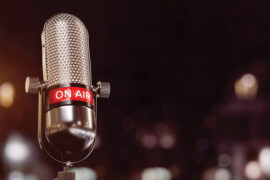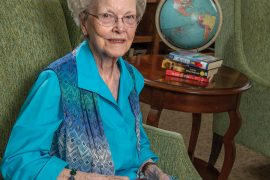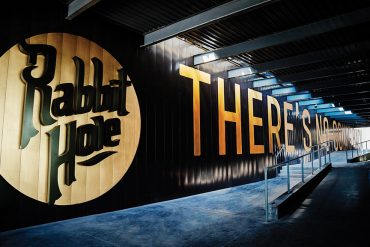HQ&A: Joe Johns
A conversation with CNN’s Senior Washington Correspondent about his years at Marshall, the news media, political divisiveness, race relations, Hillary Clinton, Donald Trump and the most memorable stories of his career.
Interview By Jack Houvouras

Long before he was a big name in the news media, Joe Johns was a big man on campus at Marshall University. The star discus thrower from Columbus, Ohio, was a track and field scholarship athlete for the Thundering Herd, setting numerous school records from 1976-1980. A bit of a renaissance man, Johns was also a standout political science student, champion debater, television reporter and a promising actor. His coaches said he had enough athletic ability on the field to compete on the international stage, while his teachers in the theater department said he possessed enough talent to become an acclaimed actor. Instead, Johns chose the news game. While finishing up a degree in political science at Marshall in 1980, he accepted a job at WSAZ-TV in Huntington and the rest is history.
Johns arrived in Washington in 1983 when he joined WRC-TV, an NBC affiliate. There, he earned an Emmy for his reporting on the violent tactics used by the Nation of Islam to rid a neighborhood of drugs. His work caught the attention of the late Tim Russert who hired Johns to work for NBC News. Johns went on to cover events on Capitol Hill, the White House and the Pentagon. Some of the biggest stories he covered at NBC included the impeachment of former President Bill Clinton, the “Beltway Sniper” saga and the Sago Mine disaster. Johns and the “NBC Nightly News” team received an Edward R. Murrow Award for his “Beltway Sniper” reporting. Along the way he somehow managed to earn a law degree from American University in Washington.
Johns’ tenure at CNN began in 2004 as a justice correspondent, covering the Supreme Court, and legal and crime issues. With his judicial expertise, Johns contributed to the network’s coverage of the Affordable Care Act as well as the controversy surrounding electronic monitoring and surveillance at the National Security Agency. Over the years, he took on a variety of assignments including crime, Washington politics, election coverage and natural disasters. He contributed to CNN’s Emmy award-winning election night coverage in 2006 and 2012, and was a member of the Peabody Award-winning Best Political Team on Television throughout the “America Votes 2008” election coverage. In 2011, his reporting contributed to two Emmy Awards for Anderson Cooper 360°’s Haiti earthquake coverage. In his current role as CNN’s senior Washington correspondent, he covers a variety of stories from the nation’s capitol. He followed closely the 2016 presidential election and the campaign of Donald Trump.
Johns is a member of the Marshall University Athletic Hall of Fame and the W. Page Pitt School of Journalism’s Wall of Fame. He is also a member of the board of the university’s Society of Yeager Scholars.
Huntington Quarterly Editor Jack Houvouras caught up with Johns in late September to get his thoughts on a variety of topics ranging from his time in Huntington, the current state of politics and the future of journalism. Unfortunately, because of John’s role as an objective journalist, there were some topics that were off limits. That said, the interview was enlightening nonetheless.
You attended Marshall University on a track and field scholarship in late 1970s. What was the university like then?
It was a community. Small class size, big reach. I lived in Hodges Hall for my first two years, though I’ve been told it has since been torn down. There are so many buildings there now that weren’t back then. I arrived about five years or so after the plane crash and the memory of it was still raw and painful. They were still rebuilding the football team and some of the players who missed the flight were still around, including Nate Ruffin.
You were a political science major. What professors had the most impact on your education?
I majored in both political science and communications (speech-theater) up until my last semester when I decided to take the poli-sci degree and get out of school. So, I had a lot of influential professors in my life. Some of the professors who had the biggest impact on me included Simon Perry and James Bruce in the political science department. Perry was the chair of the department and Bruce specialized in East European politics and was my senior advisor. He was my most challenging instructor, but also the most thought provoking. We are still in touch. Dorothy Johnson taught me broadcast copywriting. She was the chair of the Communications Department and something of a local celebrity due to her appearances on TV with her husband Bos, who was also a working journalist. Elaine Novak in the theater department pushed me as a “performer.” Ditto for N.B. East in the theater. Maureen Milicia was the speech and debate coach and pushed me into competition all over the East Coast. But, because my track and field schedule conflicted with the biggest debate competitions, I was never able to participate in single national tournament for her. That is one of my regrets.
What were some of the highlights from your time working as a reporter and anchor for WSAZ-TV?
At WSAZ, I got an on-the-job education about the fundamentals of television news. I learned how to anchor, report, write, shoot, edit and even how to produce newscasts. I’m not exaggerating, it was a full-on education. I did my very first investigative project. It was a multi-part series on how so many college athletes in those days failed to graduate and why.
What are some of your favorite memories from your years in Huntington?
One of them would have to be performing in the Rocky Horror Picture Show at the downtown movie theaters. Actually, I was both the host, emcee and the bouncer. Other memories would include Monday Night Football at Heritage Station, Marshall Homecoming and hosting the morning and evening drive on WKEE radio. Of course, springtime on campus with the flowers in bloom was always awesome.
Your career in television news began in 1980. Ironically enough that was the year CNN was founded. How has the news industry changed in the last 37 years?
It’s become 24/7. The news cycles get shorter and shorter. There are more choices. The Internet competes with TV and dilutes the audience. So does social media. We read the news on our cellphones. This whole world has exploded in terms of choices for the consumer. And the Internet has made all of us so much better informed. The technology has changed, the clothes and cars and gadgets have changed. Popular culture has changed. Everything is faster. The news gets on faster. But many of the major themes of the news from where I sit are still in line with things we were reporting way back then. Russia was the Soviet Union then and now. No matter what you call them, they are still an adversary after all these years. Iran is still Iran and it is still front page news. Back then it was the Iran hostage crisis. Now, it’s the Iran nuclear deal. Back when I started, there was a Democratic president, with a Republican waiting in the wings promising to “Make America Great Again.” And we still have a great divide over gender and race issues, just like way back then.
President Trump has repeatedly accused venerable news outlets such as NBC, ABC, CBS, CNN, the New York Times and the Washington Post of reporting “fake news.” What are your thoughts on his ongoing attacks and do you see them as a threat to a free press?
To my knowledge we’ve never had a president call the news media the enemy of the people. Journalists are protected and guaranteed freedom by the very First Amendment ever attached to the United States Constitution. The “fake news” label hasn’t impacted CNN and the “fake news” claims haven’t diminished the number of people watching. In fact, CNN just posted its most-watched third quarter in history.
With so many people turning to alternative outlets for information such as blogs, social media and websites, how can the public discern what is real news and what is not?
The technology may have changed but the rules are the same. If you really want to understand what’s happening in the world around you, it’s important to understand the source and where the information is coming from. If you see something that’s hard to believe, you almost have to consult more than one information outlet. So, you need to be curious and open-minded. And it helps when the information provider is transparent about where information is coming from. Also, trust but verify. Read more than one source before drawing opinions about the information and/or the messenger.
Turning to politics, how has the political landscape changed since 1980?
Let’s see, CNN started in June of that year. Carter vs. Reagan, the Iran Hostages, President Carter boycotted the Olympics due to Russian involvement in Afghanistan. The first White House-related event I ever covered was an appearance by First Lady Rosalynn Carter in Huntington. Today, there is a lot of reporting that suggests domestic politics has gotten more polarized and it is more difficult to find the moderates and centrists in national politics than it was back then. My senior advisor at Marshall taught about “pendulum swings” in political systems and suggested political attitudes are cyclical. I’ve found that to be true and the pendulum went to the right with Reagan and the Bushes and to the left with Clinton and Obama, now back to the right with Trump.
In 1996 while covering the White House, you traveled with First Lady Hillary Clinton on a seven-nation tour. What were your impressions of her?
I saw the one-on-one Hillary Clinton on that trip and came away with some of the same impressions that many people have described. She can be personable, humorous, with a great sense of comic timing. I didn’t always see that Hillary Clinton come out in her large campaign events, which has been cited as one of her problems as a candidate.
Were you surprised by the result of last year’s presidential election? If so, why?
The polls, when you incorporated the margin of error, showed that it was going to be close. And it was. Hillary Clinton won the popular vote which is what many pollsters projected. But they missed the mark on Trump’s near sweep in critical battleground states. I covered the president’s kickoff at Trump Tower and enough of his rallies to know how crowds reacted to him. I had long before told my kids that Trump could win.
You have witnessed the tenure of seven different presidents during your career. Thus far, how does Donald Trump rate when compared to his predecessors?
It’s too early to assess this president. He hasn’t moved much major legislation but that doesn’t mean he won’t. His approval ratings aren’t good but that could change. It’s on-the-job training, especially for a POTUS who hasn’t served a couple terms as governor of a large state. We will know more after the midterm elections.
In 2008 the voters elected the first African-American president. Nine years after the election of Barack Obama, many believe racism has actually increased. Recent events such the white supremacists rally in Charlottesville and the strong resistance to the “Black Lives Matter” movement are just two examples. Do you think racism is on the rise, and how would you assess the current state of race relations in America?
Obama’s election didn’t change American racial attitudes. Ferguson, Missouri, showed that. The country is still polarized over race.
What is the craziest story you’ve ever covered?
Politically, it was the 2016 campaign and election hands down.
In your long and distinguished career, what are the three most memorable stories you covered and why?
The Haiti 2010 earthquake. The worst thing I have ever seen.
The Washington Beltway sniper cases as they occurred. It was terrifying on a personal level because you couldn’t pump gas or walk down the street without wondering if somebody had you in a rifle scope.
The impeachment of Bill Clinton. Classic political tragicomedy — how could the President of the United States get himself in such a bad situation?
What advice would you offer college students today who are considering a career in news media?
Be curious. Look for details. Find out how things work. Ask why things matter and why they don’t. Admit what you don’t know. Don’t back down from bullies. And read everything you can.
Finally, you have been reporting the news for nearly four decades. Where do you see journalism in America in the next 40 years?
Has it been that long? I suppose it’s because I started before I graduated from college. Unlike back in the day, if you want to be a journalist you can do it all yourself on multiple platforms. You can write, edit, publish, record audio,record video, produce programs and documentaries with a computer and a decent camera. So, go for it.




